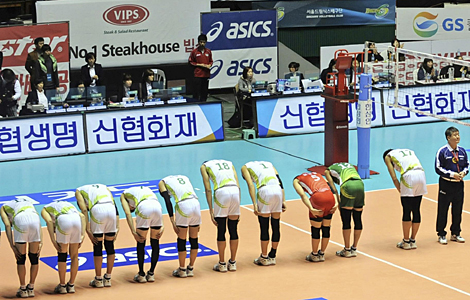Full text of Xi's interview with Washington Post
Updated: 2012-02-13 20:31
(Xinhua)
|
|||||||||||
BEIJING - Chinese Vice President Xi Jinping answered written questions from The Washington Post on Sunday in Beijing, prior to his visit to the United States.
The following is a transcript of Xi's answers.
ON US-CHINA RELATIONS SINCE 1972
Forty years ago, leaders of our two countries, with extraordinary wisdom and vision of statesmen, reopened the long-closed door to China-US exchanges. Since then, China-US relations have forged ahead despite some twists and turns and made historic achievements, bringing huge benefits to both countries and peoples. China-US relations have become one of the most important, dynamic and promising bilateral relationships in today’s world. When I visited the United States for the first time in 1985, our bilateral trade was merely $7.7 billion, and only some 10,000 mutual visits were made each year. Last year, our trade topped $440 billion, and mutual visits exceeded 3 million.
What has happened over the past 40 years tells us that a sound and stable China-US relationship is crucial for both countries and for peace, stability and prosperity of the Asia-Pacific region and the world at large. During President Hu Jintao’s visit to the United States in January last year, the two presidents agreed to build a cooperative partnership based on mutual respect and mutual benefit. This decision fully captures the features and requirements of China-US relations in the new era, that is, to develop mutually beneficial cooperation as partners based on the principle of mutual respect.
ON CHINA-US BUSINESS COOPERATION
Mutual benefit is the defining feature of China-US business ties. Since the establishment of diplomatic relations, China-US trade has grown over 180 times. Over the past 10 years, US exports to China have increased by 468 percent and created more than 3 million jobs for the United States. Forty-seven out of the 50 US states have seen three-digit or even four-digit growth in their exports to China. And US consumers have saved over $600 billion by using Chinese products. A survey conducted by AmChamChina last year shows that 85 percent of the US-invested enterprises in China saw their revenue grow in 2010, and 41 percent of them recorded higher profitability in China than their global average. The US investment in China has boosted US exports to China, accelerated US industrial upgrading, and contributed to the growth of the US economy.
As economic globalization gathers momentum, China and the United States have become highly interdependent economically. Such economic relations would not enjoy sustained, rapid growth if they were not based on mutual benefit or if they failed to deliver great benefits to the United States. The Americans who know the real picture of China-US economic relations, including those in the business community, will echo this point.
Frictions and differences are hardly avoidable in our economic and trade interactions. What is important is that we properly handle these differences through coordination based on equality, mutual benefit, mutual understanding and mutual accommodation. We must not allow frictions and differences to undermine the larger interests of our business cooperation.
We have taken active steps to meet legitimate US concerns over IPR [intellectual-property rights] protection and trade imbalance, and we will continue to do so. We will continue to press ahead with the reform of the RMB [renminbi] exchange rate formation mechanism and offer foreign investors a fair, rule-based and transparent investment environment. At the same time, we hope the United States will take substantive steps as soon as possible to ease restrictions on high-tech exports to China and provide a level playing field for Chinese enterprises to invest in the United States.
ON THE ASIA-PACIFIC REGION
China and the United States have more converging interests in the Asia-Pacific region than in anywhere else. In recent years, our two countries have coordinated closely under the framework of APEC [Asia-Pacific Economic Cooperation] and ASEAN [Association of Southeast Asian Nations] Regional Forum, and enhanced communication and cooperation on regional economic integration, counterterrorism, nonproliferation, combating transnational crimes, disaster preparedness and reduction, poverty alleviation and relevant regional hotspot issues, thus giving a strong boost to peace and prosperity in the Asia-Pacific.
What the Asia-Pacific countries care most is to maintain economic prosperity and build on the momentum of economic growth and regional cooperation. At a time when people long for peace, stability and development, to deliberately give prominence to the military security agenda, scale up military deployment and strengthen military alliances is not really what most countries in the region hope to see.
The vast Pacific Ocean has ample space for China and the United States. We welcome a constructive role by the United States in promoting peace, stability and prosperity in the region. We also hope that the United States will fully respect and accommodate the major interests and legitimate concerns of Asia-Pacific countries.
ON ECONOMIC AND SECURITY COOPERATION
In recent years, China and the United States have conducted effective coordination and cooperation in addressing major international and regional issues and meeting global challenges. This has enriched China-US relations and consolidated and expanded the strategic foundation of the relationship. China and the United States have joined hands and worked together with other countries to counter the international financial crisis and promote global economic recovery. We coordinated positions and worked for consensus at the climate change conferences in Copenhagen, Cancun and Durban. We advanced denuclearization of the Korean Peninsula and the Six-Party Talks process. We opposed the development and possession of nuclear weapons by any Middle East country in order to maintain regional peace and security. Our two countries have also had effective coordination in addressing such hotspot issues as Afghanistan, South Asia, Sudan and the Middle East.
We are at a time when the negative impact of the international financial crisis and the European debt crisis continues to spread, regional hotspot issues crop up from time to time and traditional and nontraditional security threats are intertwined. Under such new circumstances, it is all the more important for China and the United States to communicate, coordinate and cooperate more closely and work together to play a constructive and responsible role in upholding and advancing world peace, stability and development.
ON PEOPLE-TO-PEOPLE EXCHANGES
Mutual understanding and friendship between the two peoples provides a solid foundation and an inexhaustible driving force for the growth of China-US relations. I visited Iowa in 1985 when I was working in China’s Hebei province. I saw local corn farming and processing and stayed with a local family for a couple of days. I was deeply impressed by America’s advanced technology and the hospitable and industrious American people. That visit drove home to me the importance of closer exchanges between our peoples and gave me a better understanding of China-US relations.
China and the United States are two great countries, and the Chinese and American people are well disposed to and interested in each other. We all want to exchange views and learn from each other, deepen friendship and seek common development. There is no reason for our two countries not to engage in friendly cooperation. I am convinced that, with the backing of the 1.6 billion Chinese and American people, our relationship will bring greater peace, prosperity and development to the world.
ON SPORTS
I like sports, and swimming is my favorite. Doing physical exercises keeps one fit and healthy and helps one work more efficiently. I think we all need to strike a balance between work and relaxation. This can keep us energetic and help us do our job better.
NBA games are exciting to watch and have global appeal. They are very popular in China. I do watch NBA games on television when I have time.
Related Stories
Vice-President Xi visits US 2012-02-13 14:52
Yuan hits new high ahead of Xi's US visit 2012-02-11 07:36
Xi's visit to boost Sino-US relations 2012-02-08 07:16
Chinese VP's US visit to build partnership 2012-02-10 07:20
US must be objective, Xi says 2012-01-17 11:30
Hot Topics
Kim Jong-il, Mengniu, train crash probe, Vaclav Havel, New Year, coast guard death, Internet security, Mekong River, Strait of Hormuz, economic work conference
Editor's Picks

|

|

|

|

|

|







